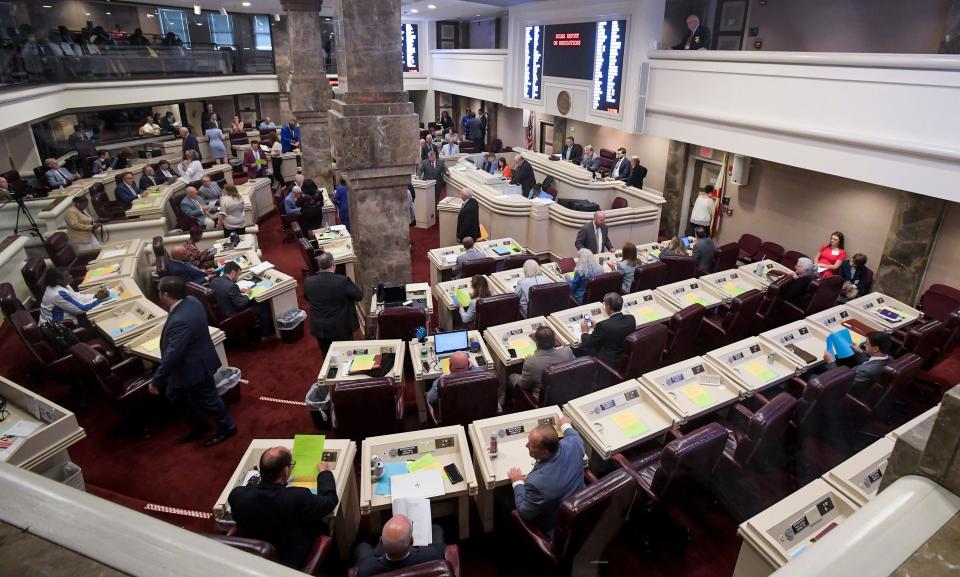Federal court blocks Alabama’s congressional map, orders new lines drawn
A three-judge federal panel Tuesday ruled that a new Alabama congressional map failed to address Voting Rights Act violations and ordered a third party to draw new lines.
In a 217-page opinion, U.S. Circuit Judge Stanley Marcus and U.S. District Judges Anna Manasco and Terry Moorer sharply criticized the Alabama Legislature, writing that they were “deeply troubled” that lawmakers did not draw a map that gave Black voters in the state the chance to elect representatives of their choosing, as the judges ordered in a January 2022 ruling.
“We are not aware of any other case in which a state legislature — faced with a federal court order declaring that its electoral plan unlawfully dilutes minority votes and requiring a plan that provides an additional opportunity district — responded with a plan that the state concedes does not provide that district,” the judges wrote. “The law requires the creation of an additional district that affords Black Alabamians, like everyone else, a fair and reasonable opportunity to elect candidates of their choice. The 2023 Plan plainly fails to do so.”
The judges wrote that directions for the drawing of new maps would follow in a separate order.
The state will likely appeal the ruling to the U.S. Supreme Court.

A message was left Tuesday morning with Rep. Chris Pringle, R-Mobile, who helped lead efforts to draw the maps. An attempt to reach Sen. Steve Livingston, R-Scottsboro, who sponsored the proposal the Legislature approved, was not immediately successful.
Benard Simelton, president of the Alabama State Conference NAACP, said Tuesday “the court meant what it said and said what it meant, and that the state of Alabama has no intention of complying with the federal court’s order nor the Supreme Court’s order.”
The Alabama Legislature approved a new congressional map in 2021 that created a single majority-Black district, which Alabama congressional maps have included since 1992. Black residents sued the state over the proposal shortly after, arguing that it packed Black voters into a single area and made it more difficult for Black Alabamians to elect leaders of their choice.
The judges ruled in favor of the plaintiffs in January 2022, citing the high degree of racial polarization in voting in Alabama, where white Alabamians, who make up about 64% of the population, tend to support Republicans and Black Alabamians tend to support Democrats. The panel ordered the state to draw new maps, saying the remedy would be a second majority-Black district “or something quite close to it.”
The U.S. Supreme Court stayed the ruling for the 2022 elections but upheld the lower court decision in June. In a special session in July, the Republican-dominated state Legislature approved a map that created a 7th Congressional District in west Alabama with a 50.65% Black voting age population, and a 2nd Congressional District in southeast Alabama with a Black voting age population of 39.93%.
Plaintiffs challenged the maps, saying they fell far short of what the court directed. The Alabama attorney general’s office argued after the map was approved that drawing a second majority-Black district would be unconstitutional and a form of affirmative action. But that argument led to strong skepticism from Marcus, Manasco and Moorer at a hearing last month. Moorer told Alabama Solicitor General Edmund LaCour that Alabama appeared to have “deliberately disregarded our instruction.”
The justices continued that thread in Tuesday’s opinion.
“We do not take lightly federal intrusion into a process ordinarily reserved for the state Legislature,” the judges wrote. “But we have now said twice that this Voting Rights Act case is not close.”
Simelton expressed confidence that the plaintiffs would prevail in any appeal.
“The federal courts are protecting those [voting rights] and that the state of Alabama is not interested in anyway ensuring fair elections,” he said. “And so I think this means that Black Alabamians will have right to help their votes heard,” Simelton said.
Alabama Reflector is part of States Newsroom, an independent nonprofit website covering politics and policy in state capitals around the nation.
This article originally appeared on Montgomery Advertiser: Federal court blocks Alabama’s congressional map, orders lines redrawn
